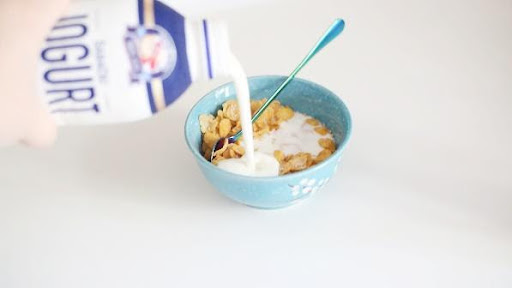When to Eat
This will vary from athlete to athlete, so a bit of experimentation will be needed, although most of the rules below will make sense for most athletes.
It is particularly in the pre-exercise eating that some experimentation might be needed, in order to check that you don't either feel lacking in energy when running, or to ensure you don't get stomach cramps.
Pre-Exercise
A lot of this will depend on the time of day you are running. If it is early in the morning you may not be able to consume much before you run, but your glycogen stores will be low, so if you have a little that would be useful.
Ideally a medium-sized breakfast that is low in fat (a large bowl of cereal or the like) should be eaten. If you can't digest this before your run, then a smaller meal - or at least a drink with carbohydrates (either a sports drink, or a smoothie) - should be taken on board.

Photo Cereal Bowl and cornflakes
Alternatively on an early morning easy run lasting around or less than 60 minutes you can run it in a ‘fasted’ state without eating beforehand. Over time this can increase your body’s efficiency as using fat as a fuel, an adaptation which can then help with prolonged endurance running such as marathons. However, sessions should not be completed in a ‘fasted’ state as your ability to train at high intensity is reduced when carbohydrate stores are depleted.
If you are running later in the day then a snack (200-400 calories) about two to three hours before you run is a good idea, in addition to your other meals. This snack should not have too much sugar in it to avoid big changes in body sugar levels. A sugary snack an hour before training (just 100-150 calories) can work well, as it provides quick energy and isn't enough to alter sugar levels too much.

Photo Mixed nuts
Generally, people eat their largest meal of the day in the evening - however, if you are running in the evening it might suit you better idea to make the main meal a lunchtime one.
Post-Exercise
For years there has been a lot of debate about post-training recovery food and drink. What is definitely true is that your body will be depleted after a run, so it is important to re-fuel. Judy Ridgway, a renowned name in the field of nutrition, says in her book "Food for Sport" that:
It is crucial to consume 50g/2oz carbohydrate in the first two hours after each training session and another 50g/2oz within the next two hours.
More recently the role of protein in post-training nutrition has been recognised as being required to re-build muscles are the stresses of exercise. It is very popular to have a protein shake at this point and studies have show Whey protein, due to it's being relatively high in leucine (one of the most important protein types) and being relatively affordable.
On the other hand another easy to source, cheap recovery drink is chocolate milk! This contains the perfect balance of carbohydrates, proteins, fats and electrolytes to quickly replenish the body following training. You can even add protein powder to it if you like!
In practice, it is a good idea to have something like this, maybe supplemented by some fruit (e.g. banana) and maybe a couple of sweets (e.g. jelly babies) and then try to eat a properly balanced main meal within a couple of hours. This is true even if you train in the evening, although it can be smaller than a regular evening meal if you've chosen to have your biggest meal of the day at lunchtime.
Throughout the Day
It is good for runners to eat little and often throughout the day (making sure you don't just add vast numbers of calories), but reduce the size of the large meals (principally the evening one). In addition it is worth keeping a drink on the go throughout the day, as in total you'll need a total of 2-3 litres of water to perform at your best.
Note: The information here is written by an athletics coaches who have read widely into the subject, and not a sports nutritionist, so is about gearing your food and drink to the practicalities of running as opposed to expert dietary advice.
